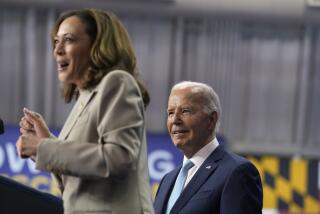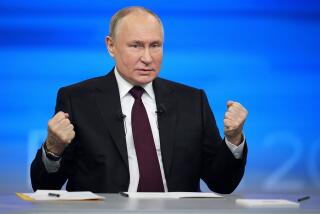Gorbachev Pleads for End to Panic : Soviet Union: He appears on television to calm consumer worries over price hikes and unemployment. Shoppers go on a buying frenzy for third straight day.
- Share via
MOSCOW — President Mikhail S. Gorbachev on Sunday implored Soviets frightened by sharp price increases and other consequences of the impending shift to a market economy “not to give in to panic” and vowed that the Kremlin will act to safeguard their living standard.
As waves of worried consumers swept through state-run Soviet stores for the third straight day, buying virtually everything in sight to beat planned price boosts, Gorbachev hastily scheduled a nationally televised address to explain the rationale of economic reforms sought by the government and their effects on people’s lives.
The transition away from a highly centralized economy, in which bureaucrats in Moscow fix prices and output levels of every item from refrigerators to pencils, “cannot be postponed because negative consequences will develop,” a sober-looking Gorbachev said. He spoke from behind a desk at the beginning of the 9 p.m. news.
“If we want a change for the better, this is the way we must go,” said the Soviet leader, who will hold summit talks with President Bush this week in Washington. “This market will help us resolve the tasks with which we have unsuccessfully wrestled for decades.”
Gorbachev acknowledged that the government’s previous economic plan, adopted by the Soviet legislature in December, had failed to end persistent shortages of foodstuffs and consumer goods or correct lagging productivity.
“We must act immediately,” Gorbachev said. “Otherwise, in the coming months or year the situation will become more tense, difficult or, to speak frankly, dangerous.”
Under the program presented last week by Prime Minister Nikolai I. Ryzhkov, bread prices will triple as of July 1 to bring them more in line with the costs of production, and prices of other foodstuffs will double, on average, starting in January.
This is a tremendous shock in a country where prices have been so permanent that they can be printed as part of the labels on cans of sardines or bottles of juice, and Gorbachev acknowledged it.
“I address you, dear comrades, with a request: not to give in to panic,” the Soviet leader implored. “Let us view all this realistically, and then we will solve the prob lem.”
Reading from notes on half-sheets of paper, Gorbachev assured people that although price increases are “inevitable” as billions of rubles in state subsidies on consumer goods are axed, a system of wage indexing will be introduced so that as prices go up, salaries will as well.
“The essence of this system will be that wages, as well as scholarships and pensions, will have to rise with the increase of prices,” Gorbachev said during his address, which lasted for slightly more than 45 minutes.
Also, on unspecified “vital foods and consumer goods,” price ceilings will be fixed by the government to protect people’s buying power, Gorbachev said. Letting those prices find their supply-and-demand level in the conditions of an “unformed market” would be “a heavy blow to the living standards of the people,” he said.
Another shock for many here is the looming specter of unemployment, long considered a product of capitalist injustice.
But some economists say the new market-style measures, by driving unproductive factories now buoyed by state subsidies into bankruptcy, could put as many as 40 million people out of work.
Gorbachev called unemployment “a big and very important problem” that could arise rapidly in the transition to a supply-and-demand market, but he assured his countrymen that the Soviet leadership is developing a program to prevent unemployment, retrain the jobless and find them new jobs.
“The person who gets in such an uneasy living situation has to be protected,” Gorbachev declared.
He vowed that the Soviet leadership would seek “national concord” on the most painful points of the reform, including the unemployment program and prices.
Last week, two of the Soviet leader’s aides had said the whole reform package would be put to a vote in a national referendum, but in view of the widespread worry the proposals have aroused, there is speculation that the leadership will drop the idea.
As outlined by Ryzhkov, the reform program envisions a three-stage transition over five years to a “regulated market economy” in which the state would gradually sell off its enterprises and move from detailed central planning to such economic levers as investment, credit, tax rates and government purchases to channel development.
Under the program, prices would be freed from government controls gradually, but in the first period there would be steep increases for most products to bring prices in line with production costs, world price levels and demand.
Members of the Supreme Soviet, the national legislature, are to resume their debate on the reform package Monday. Conservatives have opposed it as a departure from socialist tenets that will have painful human costs, while radicals call it excessively timid.
Ryzhkov warned last week that he would resign if the program does not meet with support.
In his address, Gorbachev said price increases for bread had been proposed by the Soviet people themselves, though many would certainly oppose them. By official estimate, bread makes up as much as a fifth of the average Soviet citizen’s diet.
The state spends about $28 billion annually to subsidize bread prices alone, using much of that money in scarce foreign currency to buy grain overseas.
“The cheapness of bread bears no relation to the sweat and toil that goes into making it,” Gorbachev said. “We see how children in schoolyards play soccer using rolls.
GORBACHEV STILL THE BOSS--Turmoil at home doesn’t diminish his authority to make deals at summit, Baker contends. A12
More to Read
Sign up for Essential California
The most important California stories and recommendations in your inbox every morning.
You may occasionally receive promotional content from the Los Angeles Times.













